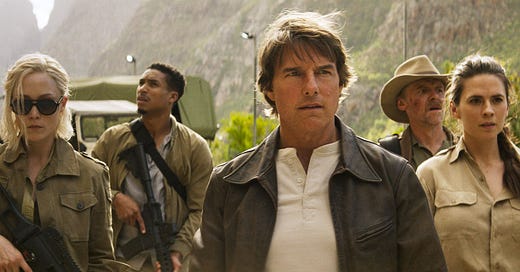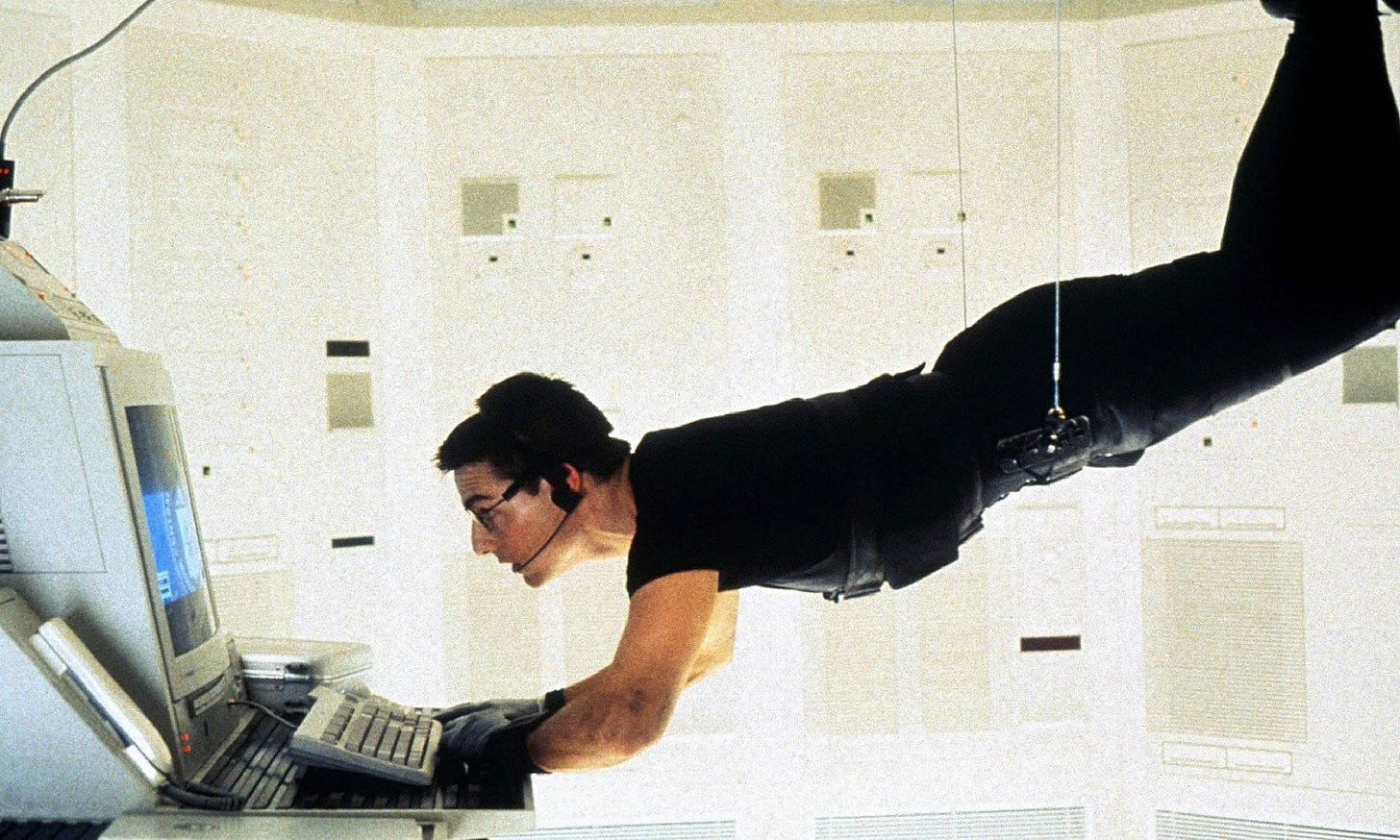Here’s a post based on this week’s episode of Fifteen-Minute Film Fanatics. The post and the podcast complement each other. There are some spoilers in the episode, but not the post, which is a deeper look at a single idea raised in the podcast. We take requests, so leave a comment below if there’s a film you’d like us to cover. We’ve done over three hundred episodes that you can find on Spotify, Apple, or wherever you get your podcasts. Please subscribe and listen wherever you get your podcasts and consider leaving a review on your platform of choice. Thanks.
In the middle of Nabokov’s Nikolai Gigol (1944), he gives a lecture on the nature of poshlost, a Russian word with no direct translation into English; the closest we get to it is “kitsch,” but without the playful connotation. (He changes the second “o” to a “u” to more accurately render the word’s sound in an English mouth, but I’ll use the traditional spelling here.) Poshlost is second-rate thinking, iconography, or art masquerading as first-rate and praised by those who think going along with the charade will make them seem more intellectual or deeper thinkers. Poshlost is the self-help book that “everybody’s reading,” the novel that “we desperately need in these dark times,” the memoir that “raises difficult questions” about “the nature of identity,” the film that “serves as a reminder of our common humanity,” or the art exhibit that “defies genre” and seeks to “reimagine the very idea of ‘art.’” These kinds of critical tags are a form of poshlost, too: say them and nod slowly and you can fool many people into thinking you’ve said something profound. Nabokov has no issue with third- or fourth-rate art, what he dismisses as “trash,” finding that works in these ranges have a “wholesome ingredient, readily appreciated by children and simple souls.” Poshlost is “far, far worse” than the kind of work “which everybody admits is cheap.” Poshlost is “the falsely important, the falsely beautiful, the falsely clever, the falsely attractive.”
Nabokov wasn’t writing about films but his idea perfectly applies to our cinematic moment: Conclave begins as a fine enough thriller but catapults into full-on poshlost in its final moments, in which the big twist is that the viewer thought he was watching a thriller but found out that he was in for a lecture. Sean Baker, writer-director of Anora, said that one aim of his film is “helping remove the stigma that’s been applied to this livelihood, that’s always been applied to this livelihood.” That “livelihood” is “sex worker,” the very phrase which is itself an example of poshlost. (“Sex worker” is also a hint that the poshlost express is entering the station.) And as for Emelia Peréz, if you’ve read this far, you get the idea.
Like carpenter ants, poshlost needs to be detected early: once it makes its way into a franchise, the foundations become weaker. The Matrix never aspires to become a philosophy textbook; the sequels do, and that’s why they go wrong. (The Matrix provokes conversations about all kinds of philosophical issues, but these are by-products of what is essentially a terrific action movie.) The crest of the waves of Avengers: Endgame and Return of the Jedi were followed by wipeouts in which the franchises decided to “tackle” (another flag) important social issues, making subsequent installments less about their audiences and more about the virtues of their creators. Each franchise moved into poshlost as if audiences would never notice, but they did. The elder Obi-Wan’s mystical nonsense about The Force is exactly the kind of movie mumbo-jumbo that nobody in the theatre takes seriously and adds to the wonderfully-vague world-building seen in the first three films. Compare “May the Force be with you” to Rose’s dying words in The Last Jedi: “That’s how we’re gonna win: not fighting what we hate [but] saving what we love.” Yikes. Compare Captain America saying, “I could do this all day” to Mrs. Marvel lamenting, “My whole life I’ve either been too white for some people or too ethnic for others. And it’s been this very uncomfortable, sucky, in-between.” The poshlost is found in the attempt to exalt what was enjoyable craft into Deeply Meaningful Art; rolling those dice is gambling with an audience’s patience and studios’ money. Christopher Nolan came dangerously close to “the falsely clever,” but always pulled Batman back just in time; when Spielberg handed Indiana Jones to James Mangold, there was no attempt to “update” the sensibility of the franchise to address all of the issues associated in the popular imagination with the end of the 1960s. Indy still has to find a Macguffin and save the world. If Jaws were made today, Hooper would conduct empathy exercises with Quint so that they could learn more about each other’s experiences and make the climax of the film what fishermen call a catch-and-release in order to “call attention” to “what is happening to marine life.” Think of the difference between the first season of The [American] Office and its last and you’ll see what happens when creative people destroy their own work in order to “elevate” it; it’s like Michael Scott (who has poshlost in his DNA) became one of the writers.
This idea of false importance is found offscreen, as well. Robert Downey Jr. has repeatedly stated that the role of Tony Stark catapulted him as if he were wearing the Iron Man suit and never cries about the “burden” of playing him or wanting to break into other “more serious” roles. (He had already done that pre-Avengers and has done it after them.) “The reason that I’m playing Tony Stark,” he said, “the reason I’m involved in Iron Man, the reason that I’m so excited, is I’m crazy about movies.” When he ad-libbed, “I am Iron Man” at the end of the 2008 film, it was like he was acknowledging in advance his gratitude towards his viewers. When asked if he felt responsible for carrying the MCU, Downey demurred and said, “I got to be the front man in a band that was going to be in the Hall of Fame no matter what.” Compare this to Daniel Craig’s tiresome complaints about playing 007, culminating in his, “I’d rather break this glass and slash my wrists” than play Bond again. Cry me a river of Spectre’s tears. Craig later backpedalled and said he “loved every second” of his five Bond films, but these culminated in the perfect poshlost of No Time to Die, in which the light touch of the previous twenty-four films and the exhilaration of Craig’s Casino Royale were traded in for a heavy hand.
The Mission: Impossible films are so successful and enjoyable because they never slip into the poshlost zone. Ethan Hunt has no social concerns other than saving the world. The villains don’t reflect contemporary anxieties (other than the vague eternal fear of Bad Guys wanting to destroy the world); the heroes of the IMF aren’t flawed or suffering from trendy psychoses; the plots are unambiguous and clean; the humor compliments the danger; the actors are charismatic and likable; and everything is conceived to engage the viewer’s imagination. When Nabokov talked about the “wholesome” element of third-rate art, he could have been talking about this series. He would have dismissed any movie like Mission: Impossible as trash (as he does with the character of Superman in his explanation) but not poshlost, and his thinking is a useful way to think about the strengths of the franchise.
Nabokov’s point that “children and simple souls” appreciate the “wholesome ingredients” of unpretentious third-rate art helps explain how the MI movies work: it’s essentially, ultimately, and wonderfully a child’s attitude that informs the films. The guardrails on our imaginations are installed as we get older, but kids playing with toy airplanes will make what they assume are the appropriate noises (“Psshhhhh! Brooooghghghg!”) as the planes just miss each other or as they toss into the air an army man with a paper-towel parachute as if he ejected just in time. The Tom Cruise Run is taken directly from a child’s imagination: in Dead Reckoning, he runs across a bridge in London when an Uber would be faster, but the kid sensibility is to run as fast as you can. You jump between buildings, ride a motorcycle against traffic, use suction cups on top of a train, and diffuse bombs by cutting the correct wires in the correct order. The organization to which you belong—the force that coordinates the resources for the impossible missions—is called the Impossible Mission Force. Anyone trying too hard to create art would give it a clever acronym.
As kids cannot tell where the actor ends and the stuntman begins, the actor and stuntman are the same person. It’s the movie magic of childhood that undergirds Tom Cruise’s big-budget films. People who talk about movies all the time substitute the names of actors and characters interchangeably. (“So that’s why when Brando is at the meeting, he doesn’t like what Sonny says: the Don knows that James Caan has a big mouth, and so Vito says that his kids speak when they should listen.”) The same thing happens even more easily in the MI films, where Ethan is, essentially, the man who plays him. Where does Ethan Hunt end and Tom Cruise begin? When we speak of actors “inhabiting” roles, we mean that they almost convince us that what they are undergoing is actually happening. In MI, it is happening—and knowing that makes the action sequences that much more exhilarating. The notion that viewers who first saw the Lumière brothers’ L’Arrivée d’un train en gare de La Ciotat screamed and ran for the exits is probably an urban legend, but the MI movies bring us closer to that audience than any other films: we see a potent mixture of fantasy and reality and simultaneously can and cannot believe what we are seeing.
Another way in which a child's sensibility informs the films is in their treatment of sex or romantic love. Bond slept with dozens of women for business and pleasure, but Ethan doesn’t have the time. After the first two films, he doesn’t give as much as an amorous look at any women and is given a wife in Part III to keep him honest; we get the sense that Ethan has feelings for Ilsa (Rebecca Ferguson), but the most we see is a half-hug like the kind you give someone at work. Nobody wants the poshlost of Ethan walking on the beach while Mary McGregor plays on the soundtrack. When Bond awakens over Kentucky and Honor Blackman says, “I am Pussy Galore,” he replies, “I must be dreaming.” Ethan would jump out of the plane. The lack of sex is like the lack of gore: there are plenty of fights with knives, guns, and fists, but none of these result in splatters of blood or makeup effects to replicate someone who has been shot in the face. (There’s even a gag in The Final Reckoning in which Ethan dismantles a bad guy but we only see Grace’s reactions.) When people die in MI, they hit the ground, just as we all did when we played Army or War or Planet of the Apes in the backyard when we were kids. And when Alec Baldwin delivers his second-best speech in movies, we get this:
Hunt is uniquely trained and highly motivated—a specialist without equal—immune to any countermeasures. There is no secret he cannot extract, no security he cannot breach, no person he cannot become. He has most likely anticipated this very conversation and is waiting to strike in whatever direction we move. Sir, Hunt is the living manifestation of destiny—and he has made you his mission.
This is all delivered without the slightest hint of irony. The MI films never aspire to more than upping their own antes. This may sound like what Alexander Pope called damning with faint praise, but it’s a mark of the franchise’s integrity that the greatest problems their creative teams sought to face were technical, not social. We’ve already had him climb the Burj Khalifa. Now what? The films are all craft, all technique, all narrative, all the same.1
The last thing a viewer sees before the first shot of Dead Reckoning is Tom Cruise thanking the viewers for schlepping to the theater:
Hi everyone. Thank you for coming to Mission: Impossible The Final Reckoning. Every mission has led to this. There’s so many people—incomparable. Director Christopher McQuarrie, my producing partner, our fantastic and extraordinary cast and crew, all worked very very hard to bring you the most authentic cinema experience that we could. So we are all so happy that you are here, in this theatre, to watch the biggest Mission yet on the big screen, the way it was meant to be seen. So please—enjoy the show, because we made it for you. Thank you.
Breaking the fourth wall before a film begins is as crazy as hanging on the wing of a biplane or riding a motorcycle off of a cliff, but Tom Cruise does it anyway because, like all the practical effects, he is convinced it will add to the experience. The key word in his thank-you is “authentic”: authenticity is exactly what poshlost lacks. Any time you roll your eyes at a character’s voicing a contemporary concern and are taken out of the experience, any time you sense that a movie has become a PSA, your poshlost detector has beeped like Benji’s geiger counter in Fallout. The mission here is to raise heart rates instead of awareness. Tom Cruise never talks about Ethan Hunt like he’s Stanley Kowalksi; all of the preparation for his performances is physical, not emotional. His “journey into the character” is performing 106 skydives to complete the HALO jump scene in Fallout or spending two years constructing and practicing on a custom BMX track for the cycle jump in Dead Reckoning or learning about what incredible air pressure can do to his oxygen level as he wingwalks in the final installment. He is continuing a tradition that runs from Harold Lloyd to Jackie Chan. And while he can play more complex roles (Magnolia, for example), that’s not why we’re all here. Light the fuse.
MI:2 doesn’t count. It’s terrible. Even Homer nods.











"... Michael Scott (who has poshlost in his DNA) became one of the writers." That is a brutal and accurate critique and also funnier than anything in the last season of The Office.
Great read, much food for thought for writers. This is one of the reasons I’ve always admired Nabokov. He has a keen eye for noticing these things and keeps his own work free of it.
It does make me mad when people look at art and criticize it for being immoral or a “bad example”. If art was made how these people wanted, it would be very pedantic and boring… and we’d all roll our eyes.
A good reminder for me to write for the story itself, not to preach to my audience.